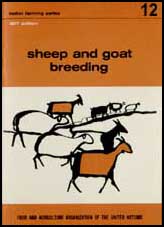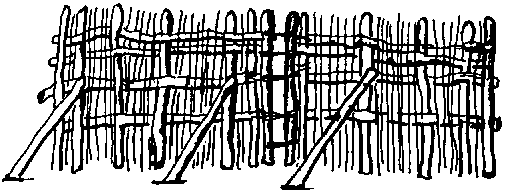
Care and housing of animals[edit | edit source]
Watching over sheep and goats[edit | edit source]
To be well fed animals must be watched over.
A farmer who leaves his animals to roam freely, who does not watch over them, has not much work to do. But his animals do not grow quickly. Animals do well, and have good health, if they are watched over.
If animals are left at large, they do not make good use of the grass.
They eat the good grasses and leave the less good ones. The good grasses are always eaten before they make seeds, and so they cannot multiply.
On the other hand, the weeds are not eaten, they grow and make plenty of seed, and they all multiply.
After the animals have finished grazing, the uneaten grass is cut down.
They damage crops.
Animals at large go into plantations and destroy the harvest.
Farmers have to make their fields a long way from the village.
So farmers lose a lot of time going to work.
The animals may hurt themselves or get diseases.
They go to the streams and catch parasites or diseases.
Why animals need a paddock[edit | edit source]
It protects the animals from wild beasts and thieves, from wind, sun and rain, from diseases.
In the village animals are kept in a traditional enclosure.
There are often too many animals. The ground is dirty and wet. The animals catch diseases. The cannot lie down to ruminate. They make poor use of their food.
Their wounds heal badly, especially those of the feet. Diseases increase. The little ones are often ill.
You cannot make good manure, though the dung of sheep and goats is good for manure. In a traditional enclosure there is only a mixture of earth and droppings. This mixture is less good for the fields than real manure.
How to watch over animals at pasture[edit | edit source]
- With a herdsman and dog
It is best for the farmer himself to watch his animals.
He can also ask some member of his family to do it.
Several farmers who know one another well may put their flocks together and jointly pay a herdsman.
The herdsman of a flock of sheep is called a shepherd.
A herdsman who does his work well must know his animals. He can see at once if they are ill. He leads them to good pasture. He does not cheat the farmer.
To help the shepherd, a dog can be trained to lead the animals and prevent them from scattering.
A well- trained dog is very useful to the shepherd.
- In a paddock
Pastures should be fenced, otherwise the animals get into plantations and destroy them.
A field 100 metres on each side is needed to feed about 8 adult animals.
Do not leave the animals too long in the field, or the grass will not grow again.
Divide the field into seven parts.
Every five days, or when you see that the grass has been well eaten, move the flock to another part.
When the last part (the seventh) is finished, go back to the first part where the grass has grown up again.
The animals manure the soil of the field with their droppings.
You can make fences by planting little trees very close together; by planting two rows of sisal or by planting thorns.
Leave a gate 2 metres wide.
In a paddock it is easier to watch over the animals. They cannot spoil the crops; they use all the grass of the pasture.
Before dividing the field into seven parts, look where the trees are in the field, so as to shelter the animals from rain and sun.
When you have had a good look, divide up the field. Each part should have a tree, and should not be far from the path.
To keep the animals in one part, you need movable fences made of wood. Make them 2 to 3 metres long and 80 centimetres high. Move the fences when you put the animals in another place.
Making these fences requires money and especially work.
It is useless to do a lot of work, and spend money, if you do not at the same time improve the animals' food, the animals' housing, the care of the flock.
